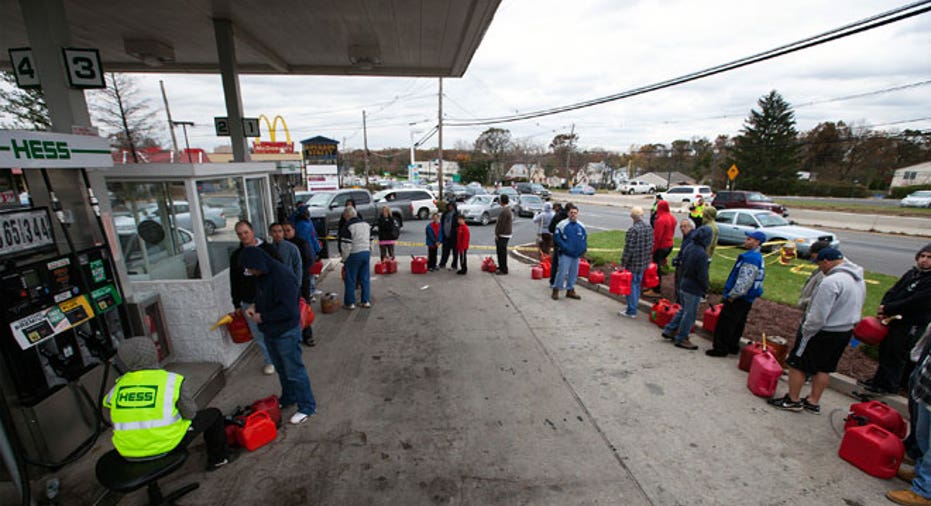In New Jersey, a Desperate Wait for Gas

Jason Nammour, 26, stood patiently in line Thursday morning hoping to fill several red five-gallon containers with gas before the pumps shut down at a Gulf station at the corner of Route 46 and 7th Street in Clifton, N.J.
Nammour, a UPS driver from Patterson, was quickly running out of time as the Gulf station was quickly running out of gas.
Sam Sadek, the station's dealer, said just before lunchtime that he probably had enough gas to last another two hours. After that...
Stretching before and behind Nammour were hundreds of others just like him: New Jersey residents stricken by Hurricane Sandy, their homes left powerless for days now, cars running out of gas and desperate for fuel to get to work – fuel to power the generators that are providing a skeletal existence as the region recovers from one of the worst storms in history.
A.J. Fusco, 22, a pizza delivery man from West Orange, had been waiting in line in his car for nearly an hour. He said his boss told him to wait "as long as it takes."
Fusco was one of scores of anxious drivers slowing inching forward toward Sadek's pumps in their cars, minivans, SUVs, work vans and pickup trucks. The line extended at least half a mile along the eastbound lanes of busy Route 46. Everybody – those on foot like Nammour and those in their cars like Fusco – had the same concern: that the pumps would run out before they reached them.
The scene in Clifton was playing out at gas stations across New Jersey where the devastating superstorm has caused fuel shortages prompting scenes reminiscent of the 1970s, when a Mideast fuel embargo also led to long lines and short tempers. There were reports of violence at gas stations Wednesday night as drivers flocked to the pumps as word spread around the region that gas was running low.
On Thursday morning at the Brookdale service stations on both sides of the Garden State Parkway in Bloomfield, the lines for gas stretched for at least a mile in both directions -- north and south -- leading up to the pumps.
The scene in Clifton was mostly peaceful, although a fight had apparently broken out earlier in the morning when a BMW tried to cut the line, according to witnesses who watched the fracas. Most of those waiting seemed resigned to the inconveniences wrought by a storm that has knocked out power for millions and destroyed whose sections of the coastline from Cape May to Connecticut.
It was Nammour's second tour at the station Thursday morning. He'd waited for two hours at daybreak to fill his car. Now he was back on foot, shuffling slowly forward with his containers to keep his neighbor's generator powered. He said he'd been standing in line for about 45 minutes, and from the looks of it he had at least another hour to go.
At this station and others like it across New Jersey, there were two lines: one for cars and another for those on foot. "They wouldn't let me fill my containers when I filled up my car," Nammour explained.
Fusco said he'd been out driving around Northern New Jersey since 7:30 a.m. looking for a station that was still pumping gas. Out of power since Monday, he said he needed the gas for his job and to keep the hot water flowing in his West Orange home.
The Gulf station on Route 46 about 10 miles due west of New York City appeared to be one of the few stations still pumping gas in Northern New Jersey.
Sadek said his pumps were shut down for two days after the hurricane knocked out power in much of Clifton on Tuesday. But he was able to start pumping again Wednesday night when his power returned about 7:30 p.m., just as nearly every other station in the region was running out. What's more, a Gulf fuel truck came by the station Wednesday night and was able to replenish some of his supply, he said.
Shortages as a gas terminal in Linden which supplies many of the gas stations in Northern New Jersey led to the shortages, Sadek explained. That, and the fact that many gas stations couldn't pump because they had lost their power.
Around midmorning on Thursday Sadek looked at the long lines of people on foot and the even longer lines waiting in cars and said the gas would probably hold out for another couple of hours. Then he'd be dry.
Asked what he was going to do when the gas ran out, Sadek shrugged his shoulders. Just then a Clifton police officer arrived to ask Sadek the same question. How was the crowd behaving so far, the officer was asked. "No bloodshed yet, so that's good," he deadpanned.
But the pumps were still flowing then.



















